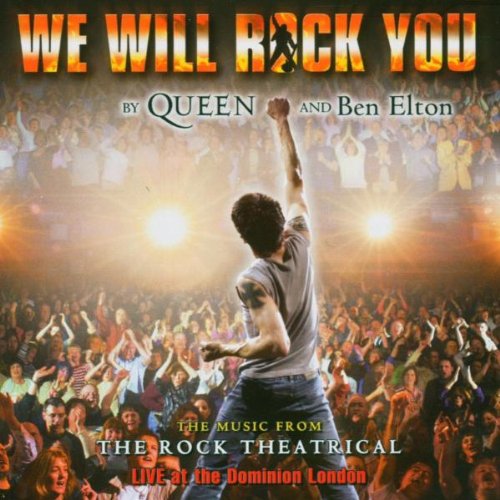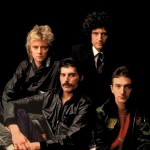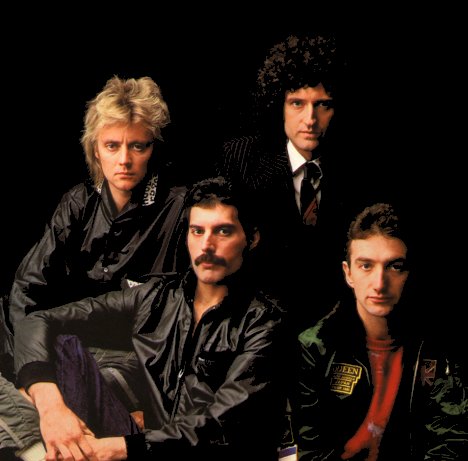09-20-2004 – Variety – WWRY Las Vegas
By Phil Gallo
(Theatre des Arts, Paris Las Vegas; 1,477 seats; $113.50 top)
LAS VEGAS Tribeca Theatrical Prods., Queen Theatrical Prods. and Phil McIntyre Entertainments in association with Paris Las Vegas present a musical in one act, music and lyrics by John Deacon, Brian May, Freddie Mercury and Roger Taylor, story and script by Ben Elton. Directed by Elton. Production design, Mark Fisher; lighting, Willie Williams; sound, Bobby Aitken; costumes, Tim Goodchild; musical staging/choreography, Arlene Philips; production stage manager, Tom Bartlett. Opened Sept. 8, 2004; reviewed Sept. 10. Running time: 1 HOUR, 55 MIN.
Galileo ….. Tony Vincent
Scaramouche ….. Kacie Sheik
Pop ….. Douglas Crawford
Khashoggi ….. Rich Hebert
Killer Queen ….. Patti Russo
Brit ….. Ty Taylor
Puff ….. Amir Talai
Oz ….. Carly Thomas
Wayne, Cop ….. Aaron Paul
Aretha ….. Rosalind Brown
Paul ….. Niki Scalera
Madonna ….. Rona N. Figueroa
Jackson ….. Derek Ferguson
Clay ….. Venny Carranza
Donny ….. Andrew Turtletaub
Jessica ….. Chris Klink
Tim, Cop ….. Will Swenson
Elvis ….. Steve Connolly
Ensemble: Jenny Jackson, Sarah McLellan, Timothy George Anderson, Maria Davidson, Jennifer Dinoia, Richard J. Hinds, Nam Holtz, Jeremy Kocal, Mychael Ludwin, Luke Merryman, Michele Micholas, Kristen F. Oei, Annette Simmonds, Megan E. Stephans, Jonathan Warren, Paula Wise.
The song “Bohemian Rhapsody,” campy upon its release in 1974 (yet cemented as a monument for a different generation by “Wayne’s World”), is the inspiration of “We Will Rock You,” the all-Queen musical imported, in an altered form, from London. That classic song, with its Marx Bros. mayhem, orchestral sprawl, lyrics that strike like an avalanche and terrifying guitar solo, has been one of rock ‘n’ roll’s most mystifying singles. A lot of the same can be said for “We Will Rock You,” except for one key ingredient: “Bohemian Rhapsody” works.
“We Will Rock You” is set 300 years in the future, in a world free of rock ‘n’ roll. The government, run by Killer Queen (Patti Russo) and Khashoggi (Rich Hebert), rigidly enforces rules regarding conformity in all phases of life; music has been reduced to computer-generated sounds.
A group of outcasts, the Bohemians (natch), live in a junkyard and celebrate their perception of rock ‘n’ roll cobbled together from remnants of posters, videotapes, lyric sheets, recordings and magazine articles. They await “the Dreamer,” an individual born with lyrics and rock facts inexplicably planted in his brain.
OK, so the Queen musical is no different than the Abba musical or the Billy Joel musical: The storyline is an excuse to get from one hit to another. But Ben Elton’s book is too often a forced setup for a shoe-horned song. Las Vegas, one of “Rock You’s” locales, is placed underwater seemingly to give “Seven Seas of Rhye” a place in the show. Oddly enough, no place is found in the story for “Bohemian Rhapsody,” leaving it to be the evening’s encore.
Yet much as “We Will Rock You” has a story in play, it ultimately draws far too much attention to the creators of the Queen songbook, especially singer Freddie Mercury.
“Mamma Mia!” and “The Who’s Tommy” won over auds by keeping Abba and Pete Townshend backstage. “Rock You” has placed Mercury on a pedestal, figuratively and literally, equal to Elvis in a way that’s troubling in several directions: Most significantly, none of the performers have Mercury’s vocal talents. In effect, “Rock You,” with a killer band aping Brian May’s finely honed solos, is constantly reminding the audience they’re not listening to Freddie.
Second, Queen may have sufficient resonance in England (where the group is considered near the Beatles in music-history reverence), but it’s unlikely Mercury-mania can fill nearly 1,500 seats per show, 10 shows per week, in Vegas for years to come. (Within the show, they predict a run of 150 years. Uh-huh.)
From the leads to the chorus, “We Will Rock You” is full of average performers, most of whom have a greater feel for stepping and kicking than the high-voltage theatrics of Mercury, a singer who knew how to make intimate connections within the bombastic material. At one point, screens float against the backdrop with B&W images of fallen rock and country(?) stars, yet another reminder that they don’t make ’em like they used to.
“Rock You’s” strongest perf comes from Kacie Sheik, a likable actress who plays Scaramouche, the female loner and outcast who travels with Galileo. Her dialogue, especially when bickering with Galileo, is annoyingly whiny, even when she’s making sexual wisecracks — but Sheik manages to transcend the book’s limits with winning facial expressions and a tenderness in her voice, especially on her duet with Galileo, “You’re My Best Friend.”
Tony Vincent plays Galileo the loner well, and “easy come, easy go/a little high, little low” is a perfect assessment of his portrayal. But as his character is transformed to an unwitting leader, he stumbles, never convincingly giving the Bohemians a person they can believe in. The music at the end — the title song and “We Are the Champions” — tells a far different story than Vincent’s slumped body language.
Show draws a considerable amount of humor denigrating “American Idol” and its ilk, as well as shows at other Vegas casinos. It’s odd, then, that soloists in “We Will Rock You” employ techniques that get overworked by “Idol” contestants: the vibrato on held notes, uneasy opening verses followed by big finishes, a sense that the exposure of a personality is as vital to a vocal perf as the singing itself.
Ty Taylor, as the rambunctious Brit, does himself no favors by swallowing words on the rockabilly ditty “Crazy Little Thing Called Love”; Patti Russo has a fine voice but the character of Killer Queen is one over-the-top note; and the hippie who opens the show, Pop (Douglas Crawford), is ultimately out of place as his narrator role never fully develops.
Arlene Philips’ choreography has an outdated aerobics feel (Are these steps left over from a Queen video?) and, amid the ho-hum production design of Mark Fisher and Elton’s timid direction, neither movement nor visuals provides anything stunning to look at.
The night closes with Queen’s best-known number, “Bohemian Rhapsody,” after a giant screen has been lowered that asks the audience if they are interested in hearing it. Hell yes, they respond. It works as well as “Mamma Mia!’s” concert scene finale; the actors break down the fourth wall and invite the audience to celebrate with them.
It’s a formula that should work in Vegas — sending the audience into the casino pumped and full of life to keep the party going. By the time they hit that first blackjack, all the holes in the plot, the absence of spectacular visuals and triple-digit ticket prices may be forgotten.



